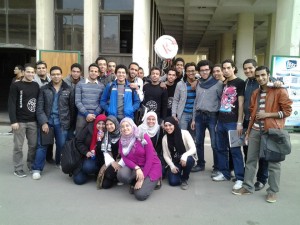
Courtesy of K Vector
Egypt’s manufacturing ability has dwindled over the years and serious doubts exist regarding whether the country will be capable of producing something of high quality any time soon. Engineering students at Cairo University are trying to change that.
The students have challenged themselves to try and foster a generation of engineers that will go on to manufacture the first Egyptian car, build a skyscraper and even establish a research and design centre for artificial limbs. Their first step was to create a student organisation called the K Vector Foundation.
The foundation is run purely by students. We contacted one of the students, Ahmed El-Assar, who is responsible for the foundation’s public relations. The foundation’s name is an engineering concept that El-Assar tried to explain to us: “K Vector represents the Z-axis, whose direction is up and K is a unit or a small vector of the Z-axis, which means that we are taking small steps (K vectors) upwards.”
“The idea for K Vector came to us during our freshman year. We wondered why our country cannot manufacture cars like Germany, for example. Then we realised that manufacturing cars can help our country in all fields, so we began to work towards this goal by first developing ourselves technically and managerially,” El-Assar explained. “As our numbers increased we trusted our dreams more and decided to work in three branches simultaneously; mechanical, biomedical and civil architecture.”
The three branches are supervised by professors Dr Magdy Mores, Dr Mohamed Ibrahim and Dr Soheer Hawaas from the Faculty of Engineering.
The students are very passionate about their foundation and so they are careful about who joins the initiative. “We look for students who will benefit the most from our workshops and sessions. Our main purpose for these workshops is to develop all of us so we can fulfil our goals after graduation. We conduct interviews to find participants that suit our criteria for these workshops,” said El-Assar. The total number of participants will eventually be 300 students.
The activities are divided into two phases: “The first phase is the undergraduate phase. During this phase we will focus on developing ourselves in engineering and managerial sectors to be able to work on our goals after graduation. In the after graduation phase all of us work with what we have already learnt and we will also organise workshops for work-related skills like human resources, marketing and project management.”
K-Vector’s activities will continue for the entire academic year. The opening ceremony will take place this Thursday at Amir Taz Palace with a number of speakers, including Egyptian inventor Mohamed Abla and youngest chartered engineer Youssef Wahby, and will be attended by public figures such as Belal Fadl and Adham Abdel Salam.




